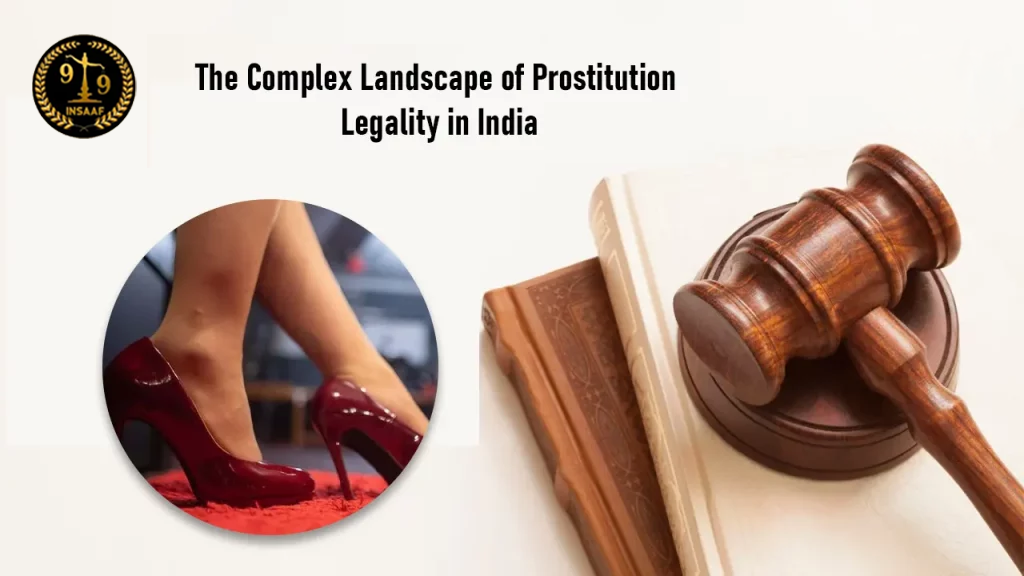

Online Legal Advice from Insaaf99® Online Lawyer Consultation in India


Online Legal Advice from Insaaf99® Online Lawyer Consultation in India

In the diverse Indian society, where ancient traditions blend with modern sensibilities, the legality of prostitution remains a complex and often debated issue. While the exchange of sexual services for monetary compensation is not explicitly outlawed, numerous related activities are strictly prohibited, creating a legal conundrum that has left many questioning the true status of prostitution Legal in India.
Prostitution, a globally contentious issue, has been a subject of debate and regulation. In India, renowned for its diverse cultural and legal landscapes, the status of prostitution is no exception. This article explores the question: Is prostitution legal in India?
The Immoral Traffic (Prevention) Act (ITPA) of 1956 is the key legislation addressing prostitution in India. While the act doesn't explicitly criminalize prostitution, it prohibits various associated activities, including soliciting in public, owning or managing a brothel, and pimping. This approach aims to safeguard individuals, especially women and children, from exploitation and trafficking.
However, the enforcement of the ITPA has been inconsistent, allowing the persistence of brothels and street prostitution. This lax enforcement raises concerns about the safety and well-being of sex workers, who encounter stigma, discrimination, and barriers to healthcare and social services.
Also Read: - Tax Incentives for Good: Section 11 of Income Tax Act and the Landscape of Charitable Contributions
1. Immoral Traffic (Prevention) Act (ITPA):
2. Indian Penal Code (IPC) of 1860:
3. Constitutional Provisions (Article 23):
Proponents of prostitution legalization argue that it would provide sex workers with greater protection and recognition of their rights. They contend that criminalization only serves to drive the industry underground, making it more difficult to regulate and monitor, and leaving sex workers vulnerable to exploitation and abuse.
Moreover, they argue that legalization would allow for the implementation of safety measures, such as regular health checkups and access to education and rehabilitation programs. This, they believe, would empower sex workers to make informed choices about their lives and protect them from harm. Review, rewrite and make it unique

Those against the legalization of prostitution voice ethical and moral reservations, contending that it could sanction the exploitation of vulnerable individuals, particularly women and children. They argue that the nature of prostitution is inherently degrading and harmful, and legalizing it may perpetuate cycles of exploitation and abuse.
Additionally, critics express apprehensions regarding the potential societal repercussions of legalization, suggesting that it could normalize the transaction of sex for financial gain, potentially eroding traditional values associated with family and marriage.
India's diverse legal landscape has created a scenario where the legality of prostitution lacks uniformity, leading to confusion for both sex workers and law enforcement.
The Indian judiciary has significantly shaped the legal narrative on prostitution. Landmark rulings, including the Supreme Court's decision in Budhadev Karmaskar v. State of West Bengal, underscore the importance of distinguishing between voluntary and forced prostitution. This rights-based approach prioritizes the protection of sex workers over their criminalization.
Beyond legal dimensions, societal attitudes and cultural norms play a crucial role in defining the status of prostitution in India. Deep-seated stigmas surrounding sex work affect individuals involved in the profession. Advocates for sex workers' rights call for de-stigmatization and the implementation of policies that prioritize their well-being.
The discourse on legalizing prostitution in India is intricate, marked by valid arguments from both sides. The intricate challenge is to devise a solution that harmonizes the rights and welfare of sex workers with broader societal concerns associated with the practice.
In conclusion, the legality of prostitution in India is a nuanced and intricate issue. While the Immoral Traffic (Prevention) Act forms the national framework, the regulation of sex work diverges significantly among states and union territories. The judiciary's emphasis on the rights of sex workers has added depth to the understanding of this complex issue. Ongoing discussions underscore the necessity for a comprehensive and uniform approach that upholds the rights and dignity of individuals in sex work, while also addressing the concerns of society as a whole.
Insaaf99, an innovative online legal consultation platform, revolutionizes access to justice. With a user-friendly interface, it connects individuals with experienced legal professionals, offering swift and confidential consultations. Clients can seek advice on diverse legal matters, from civil to criminal cases, conveniently from their homes. Insaaf99 ensures affordable and accessible legal guidance, breaking down barriers to justice. This platform not only saves time and resources but empowers individuals by demystifying the legal process. In an era where digital solutions redefine services, Insaaf99 emerges as a crucial bridge between legal expertise and those seeking timely assistance.